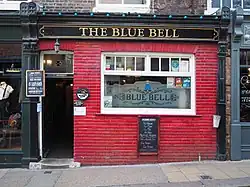| The Blue Bell | |
|---|---|
 The Blue Bell in 2018 | |
Location in York | |
| General information | |
| Type | Public house |
| Location | York, North Yorkshire |
| Address | 52 and 54, Fossgate, York, YO1 9TF |
| Coordinates | 53°57′31″N 1°04′45″W / 53.95871°N 1.07911°W |
| Completed | late 17th century |
| Designations | |
Listed Building – Grade II | |
| Official name | The Blue Bell |
| Designated | 1954-96-14 |
| Reference no. | 1257825 |
| Website | |
| https://bluebellyork.com/ | |
The Blue Bell is a historic pub in the city centre of York, England. The pub lies on the south-west side of Fossgate.
History
The building was constructed in the late 17th-century, as a five-bay timber-framed house, with a central staircase. It originally had a jettied front, but it was refronted in the 18th-century. The facade of the lower two floors was replaced with brick, while the top floor appears to have been retained and rendered over. At the rear, the original jettied facade survives, although its ground floor is obscured by later outbuildings. Around this time, the house was divided in two, the other half becoming 54 Fossgate.[1] In 1798, 53 Fossgate opened as The Blue Bell.[2] The pub was later purchased by C. J. Melrose and Sons, a local chain of pubs and wine merchants. In 1903, the chain refurbished it, and it retains its layout and fittings from this period. These include doors, windows, glazed screens with service hatches and varnished matchboarding on the walls.[3] In 1974, it suffered a fire, but largely survived intact. Plans emerged in the 1990s to expand the pub, but these were abandoned.[4]
The pub is entered through a corridor, widened slightly into a lobby, which contains a single tip-up seat by the bar. CAMRA considers this lobby a forerunner of the drinking lobbies which became popular in northern England in the inter war period.[3]

In 1903, George Robinson became the landlord of the pub; he was later the founding director of York City F.C., and the club initially held its meetings in the pub. On his death, the licence passed to his wife, Annie, and then to their daughter, Edith Pinder.[4] She only retired in 1992, since when it has changed hands several times but has been maintained in the same style. Originally grade II listed in 1954, in 1997 it was upgraded to grade II* on the strength of its interior, one of very few pubs to be awarded this grade for internal features.[2][3]

In 2017, the pub was listed as an asset of community value, in reaction to concerns that, following a take-over of owners Punch Taverns, it might be asset stripped. At the time, it sold beers and ciders, pork pies and bread, but banned large groups, swearing, music and fruit machines.[2][5] One of the smallest pubs in the city, it has a capacity of 65 people.[6] In the past, it experimented with discouraging large groups by putting up signs reading "private party", which regulars knew could be ignored. This led to its removal from the Good Beer Guide, and a new landlord in 2018 abandoned the approach.[4]
References
- ↑ Historic England. "THE BLUE BELL (1257825)". National Heritage List for England. Retrieved 12 June 2021.
- 1 2 3 Turnbull, Catherine (8 September 2017). "Bid to protect 1798 Blue Bell pub". The Press. Retrieved 12 June 2021.
- 1 2 3 Gamston, David (2014). Yorkshire's Real Heritage Pubs (2 ed.). St Albans: Campaign for Real Ale. p. 52. ISBN 9781852493158.
- 1 2 3 Gaz, Guzzling (8 November 2015). "The pub that never changes is about to change..." The Press. Retrieved 12 June 2021.
- ↑ "Successful assets of community value nominations". City of York Council. Retrieved 12 June 2021.
- ↑ "Blue Bell shuts again, as 'upset, angry' landlord responds to Tier 2 restrictions". York Mix. 16 October 2020. Retrieved 12 June 2021.